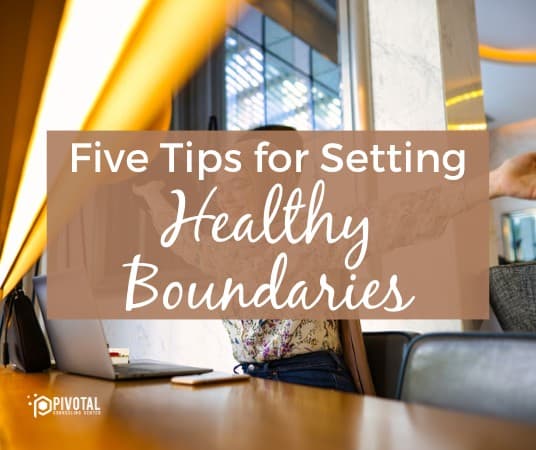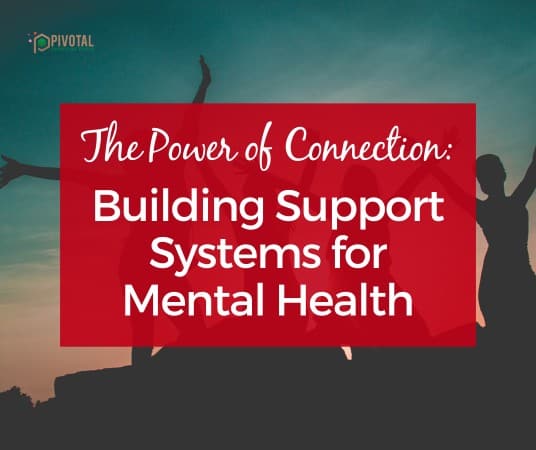
Building and maintaining healthy relationships can be difficult. Whether you’re at work, with family, friends, or a significant other, all relationships require a healthy set of boundaries in order to remain successful and fulfilling to everyone involved.
Boundaries are limits we place around ourselves in order to retain our identity and protect our mental well-being.
Without boundaries, you may find yourself doing more than required in a new workplace. You might demand too much time from a partner or friend or even have trouble saying “no” to a family member.
Setting and maintaining boundaries helps you become more assertive with the people in your life. They also alleviate stress and pent-up feelings of resentment or anger you may have towards those around you. But remember that people aren’t mind readers! Communication, compassion, and a ton of practice are all required to set and maintain healthy boundaries.
Here are five tips to help you establish healthy boundaries in your daily life.
Identify your boundaries
The first step to setting healthy boundaries is to understand what your boundaries are and why they’re important to you. Writing down a list of your values and beliefs can be a helpful way to start figuring out your boundaries, as it provides a clear understanding of what’s most important to you in your relationships at work, at home, and in social circles.
Once you are able to identify your boundaries, you’ll have an easier time communicating your needs to those around you.
When figuring out your own boundaries, it’s also essential to keep in mind the boundaries of others. Being cognizant and respectful of someone else’s boundaries opens the door for mutual respect and a healthier relationship. If you appreciate the boundaries of others it is more likely they’ll respect your own as well.
Communicate your boundaries
After you’ve figured out your boundaries, you should be ready to implement them to those around you. Unfortunately, this is often easier said than done.
If you’re someone who struggles with confrontation or saying “no”, you might feel guilty about setting boundaries with those around you. You might even fear how they’ll react. But if you allow fear of rejection or guilt to keep you from setting those boundaries, it could result in you being taken advantage of by those around you, especially in a toxic work environment.
Expressing your boundaries with the people in your life can be difficult and a bit awkward at first. Doing so, however, provides them with a clear understanding of what you want or what you will tolerate. Communicating your limits can also improve trust and communication if those boundaries are respected by the other person.
Try setting healthy boundaries early in new relationships
While setting boundaries with close friends and family can be a challenge, especially if no boundaries were ever established before, you could build toward this by setting boundaries in new settings and relationships.
If you’ve started a new job and value time away from the office, try communicating to your boss as soon as possible about your need for personal time. Speaking with coworkers the first time a boundary is crossed is also essential.
Setting boundaries early in budding romantic relationships is also important. They establish a clear line of communication of what will be and what won’t be tolerated. If you feel like your new partner is demanding too much of your time, it’s important to communicate your need for more space. Though it may be difficult, setting boundaries early allows for better communication in new relationships, and helps make them easier to navigate moving forward.
Be consistent with your boundaries
Boundaries can be difficult to establish, and even more so to maintain. While most people around you will understand and accept your boundaries, there will be others who don’t.
There might be coworkers who call you lazy for never staying late or doing more than required. Maybe your mother might get upset if you refuse to talk on the phone. These reactions could leave you feeling guilty, but staying consistent with your boundaries will keep things clear with others on where you stand.
If you are not consistent with your boundaries, you might find yourself easing up or adjusting them for the comfort of others. And while those moments can sometimes be interpreted as compromise, it’s important to reinforce the boundaries you’ve set in place. If not, you might risk being taken advantage of or giving up on the boundary all together.
It’s reasonable to have boundaries. As long as it’s not about controlling someone else’s behavior, it’s okay to enforce your boundaries.
Communicate when your boundaries are being crossed
Not everyone around you is going to understand or respect your boundaries. There will also be those who disregard them completely. You might have a coworker who shares too much personal information at work, or a family member who likes to show up at your house unannounced. If there is someone in your life who consistently crosses the line, they’ll need a few reminders concerning their behavior.
Communicating these feelings can be tricky, however, because these conversations can quickly turn confrontational. It’s important to address these issues in a calm manner. Using “I” statements and clear communication while addressing concerns to a loved one or coworker can ease the tension of the awkward discussion.
Can boundaries be too rigid?
Boundaries are essential to every relationship, but they can sometimes be dismissed or overlooked. While boundaries promote a sense of autonomy, it’s important to be wary of the rigidity of your boundaries.
Allowing your boundaries to dictate your emotions and actions can be just as detrimental as not having any boundaries at all.
Keep in mind that healthy boundaries are about expressing your personal needs to others while acknowledging and respecting theirs. Healthy boundaries promote assertiveness with those around you, not assert control over them.
There are many other ways to practice boundary-setting, like starting with a few, small boundaries and working your way up. Taking time for yourself when you’re feeling overwhelmed is also a helpful technique.
Working with a therapist can help you to consider your boundaries and work on communicating them. Whether you’d prefer to work one-on-one or would like to discuss healthy boundaries in a couples counseling session, our therapists can help.
Get in touch with our office today to set up an appointment.
Pivotal Counseling Center is now accepting Medicaid including Blue Cross Community Medicaid, Meridian Medicaid, and Molina Medicaid for outpatient counseling.









